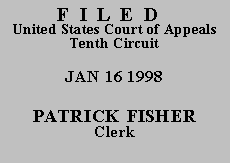

| PHILLIP CORDOVA,
Petitioner-Appellant, v. ROB PERRY, Secretary of the New Mexico Department of Corrections; ATTORNEY GENERAL OF THE STATE OF NEW MEXICO, Respondents-Appellees. |
|
Petitioner Phillip Cordova appeals the district court's decision adopting the magistrate judge's report and recommendation, dismissing Mr. Cordova's petition for a writ of habeas corpus under 28 U.S.C. § 2254. After Mr. Cordova filed his notice of appeal, the district court issued an order denying him a certificate of appealability and, pursuant to Fed. R. App. P. 22(b), we will consider Mr. Cordova's notice of appeal to constitute a request for issuance of a certificate of probable cause for appeal.(1) In Barefoot v. Estelle, 463 U.S. 880 (1983), the Supreme Court held that "a certificate of probable cause requires petitioner to make a substantial showing of the denial of a federal right." 463 U.S. at 893 (citations omitted). This requires that the petitioner demonstrate that the issues presented are debatable among jurists of reason, that a court could resolve the issues differently or that the questions deserve further proceedings. See id. at 893 n.4. After careful examination of petitioner's application, the entire record, the district court's order and the magistrate judge's report and recommendation, we conclude that petitioner has failed to make the required showing. Consequently, petitioner's request for a certificate of probable cause is DENIED and the appeal is DISMISSED. Petitioner's claims that the magistrate judge exceeded his authority under, or otherwise did not follow the procedures of, 28 U.S.C. § 636(b) are without merit. All outstanding motions are denied. The mandate shall issue forthwith.
Entered for the Court
Circuit Judge
*. This order and judgment is not binding precedent, except under the doctrines of law of the case, res judicata, and collateral estoppel. The court generally disfavors the citation of orders and judgments; nevertheless, an order and judgment may be cited under the terms and conditions of 10th Cir. R. 36.3.
1. The Supreme Court, in Lindh v. Murphy, 117 S. Ct. 2059, 2068 (1997), held that the new provisions of Chapter 153 of Title 28 of the United States Code, which includes the § 2253(c) certificate of appealability requirement, added by the Antiterrorism and Effective Death Penalty Act of 1996 (AEDPA), are generally not applicable to cases filed before AEDPA's effective date, April 24, 1996. See United States v. Kunzman, 125 F.3d 1363, 1364 n.2 (10th Cir. 1997). This circuit has therefore held that § 2254 petitioners who filed their petitions in district court prior to the effective date of AEDPA, as in this case, do not need a certificate of appealability. Id. Petitioner, however, is subject to § 2253's previous requirement that he obtain a certificate of probable cause to appeal. 28 U.S.C. § 2253.